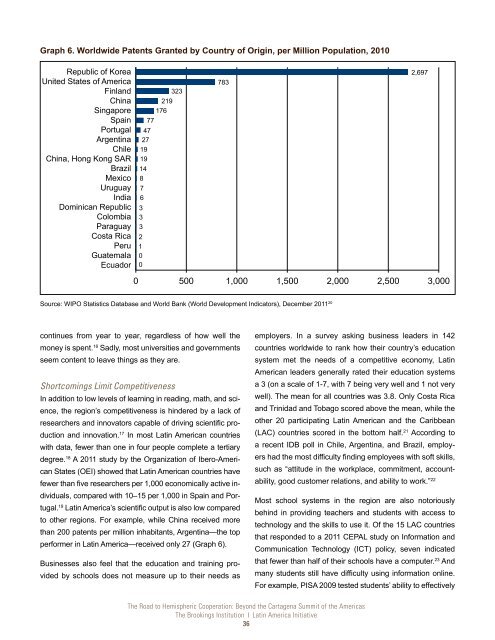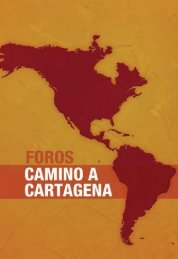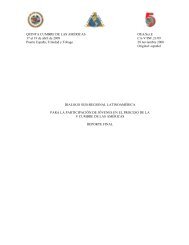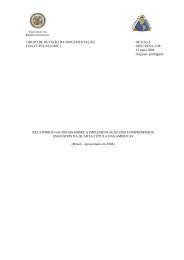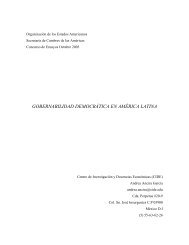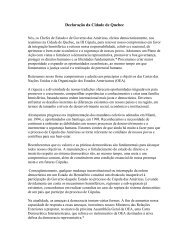The Road to Hemispheric Cooperation: Beyond the Cartagena
The Road to Hemispheric Cooperation: Beyond the Cartagena
The Road to Hemispheric Cooperation: Beyond the Cartagena
Create successful ePaper yourself
Turn your PDF publications into a flip-book with our unique Google optimized e-Paper software.
Graph 6. Worldwide Patents Granted by Country of Origin, per Million Population, 2010<br />
Republic of Korea 2,697<br />
United States of America<br />
783<br />
Finland<br />
323<br />
China 219<br />
Singapore 176<br />
Spain 77<br />
Portugal 47<br />
Argentina 27<br />
Chile 19<br />
China, Hong Kong SAR 19<br />
Brazil 14<br />
Mexico 8<br />
Uruguay 7<br />
India 6<br />
Dominican Republic 3<br />
Colombia 3<br />
Paraguay 3<br />
Costa Rica 2<br />
Peru 1<br />
Guatemala 0<br />
Ecuador 0<br />
0 500 1,000 1,500 2,000 2,500 3,000<br />
Source: WIPO Statistics Database and World Bank (World Development Indica<strong>to</strong>rs), December 2011 20<br />
continues from year <strong>to</strong> year, regardless of how well <strong>the</strong><br />
money is spent. 16 Sadly, most universities and governments<br />
seem content <strong>to</strong> leave things as <strong>the</strong>y are.<br />
Shortcomings Limit Competitiveness<br />
In addition <strong>to</strong> low levels of learning in reading, math, and science,<br />
<strong>the</strong> region’s competitiveness is hindered by a lack of<br />
researchers and innova<strong>to</strong>rs capable of driving scientific production<br />
and innovation. 17 In most Latin American countries<br />
with data, fewer than one in four people complete a tertiary<br />
degree. 18 A 2011 study by <strong>the</strong> Organization of Ibero-American<br />
States (OEI) showed that Latin American countries have<br />
fewer than five researchers per 1,000 economically active individuals,<br />
compared with 10–15 per 1,000 in Spain and Portugal.<br />
19 Latin America’s scientific output is also low compared<br />
<strong>to</strong> o<strong>the</strong>r regions. For example, while China received more<br />
than 200 patents per million inhabitants, Argentina—<strong>the</strong> <strong>to</strong>p<br />
performer in Latin America—received only 27 (Graph 6).<br />
Businesses also feel that <strong>the</strong> education and training provided<br />
by schools does not measure up <strong>to</strong> <strong>the</strong>ir needs as<br />
employers. In a survey asking business leaders in 142<br />
countries worldwide <strong>to</strong> rank how <strong>the</strong>ir country’s education<br />
system met <strong>the</strong> needs of a competitive economy, Latin<br />
American leaders generally rated <strong>the</strong>ir education systems<br />
a 3 (on a scale of 1-7, with 7 being very well and 1 not very<br />
well). <strong>The</strong> mean for all countries was 3.8. Only Costa Rica<br />
and Trinidad and Tobago scored above <strong>the</strong> mean, while <strong>the</strong><br />
o<strong>the</strong>r 20 participating Latin American and <strong>the</strong> Caribbean<br />
(LAC) countries scored in <strong>the</strong> bot<strong>to</strong>m half. 21 According <strong>to</strong><br />
a recent IDB poll in Chile, Argentina, and Brazil, employers<br />
had <strong>the</strong> most difficulty finding employees with soft skills,<br />
such as “attitude in <strong>the</strong> workplace, commitment, accountability,<br />
good cus<strong>to</strong>mer relations, and ability <strong>to</strong> work.” 22<br />
Most school systems in <strong>the</strong> region are also no<strong>to</strong>riously<br />
behind in providing teachers and students with access <strong>to</strong><br />
technology and <strong>the</strong> skills <strong>to</strong> use it. Of <strong>the</strong> 15 LAC countries<br />
that responded <strong>to</strong> a 2011 CEPAL study on Information and<br />
Communication Technology (ICT) policy, seven indicated<br />
that fewer than half of <strong>the</strong>ir schools have a computer. 23 And<br />
many students still have difficulty using information online.<br />
For example, PISA 2009 tested students’ ability <strong>to</strong> effectively<br />
<strong>The</strong> <strong>Road</strong> <strong>to</strong> <strong>Hemispheric</strong> <strong>Cooperation</strong>: <strong>Beyond</strong> <strong>the</strong> <strong>Cartagena</strong> Summit of <strong>the</strong> Americas<br />
<strong>The</strong> Brookings Institution ❘ Latin America Initiative<br />
36


